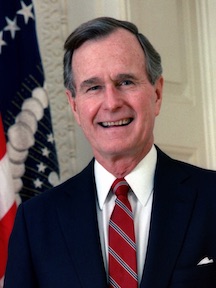By Joe Slama
George H.W. Bush, 41st President of the United States, father of the 43rd, decorated U.S. Navy pilot, the last commander-in-chief to have fought in the Second World War, and ΦΒΚ alum from Yale University in 1948, passed away at his Houston, Texas, home on Friday, November 30.
His already famous last words, “I love you, too,” were uttered over the phone to his eldest son, George W. Bush, across a generation, both of family and of men who held the Oval Office.
Bush’s death brought to the surface memories of a kind, genial, and patriotic statesman, which many contrasted with an embittered contemporary political climate. He served only one term in office, succeeding his fellow Republican Ronald Reagan, under whom he served as Vice President (notably the first incumbent from that position to win the presidency in 152 years, since Martin Van Buren in 1837). But to focus on a failed bid for a second term would be to downplay a profound, life-long career of service to the country.
After serving in the House of Representatives for Texas’ 7th District from 1967 to 1971, Bush went on to become the tenth United States Ambassador to the United Nations for two years. Subsequently, Bush sat as Chairman of the Republican National Committee, then served as envoy to Beijing. He served for one year as Director of Intelligence before his term in the vice presidency.
His presidency, rising at the waning of the Cold War, was marked by what many saw as a lack of cohesion, what he termed “the vision thing” in private notes. Bush saw himself as a “practical man,” focusing on grounded reality and not “the airy and abstract.”
He appointed two Supreme Court Justices: David H. Souter and Clarence Thomas, the latter of whom succeeded Thurgood Marshall and still sits on the Court today.
Bush faced a near-stalemate with the U.S. Congress, both houses of which were controlled by the Democrats. This led to what became known as his “veto strategy” as he denied 44 bills that came to his desk. This tension between the legislative and executive branches also led Bush to raise taxes at the behest of Congressional Democrats, backing on a campaign promise and angering his fellow partymates.
Two of Bush’s landmark accomplishments include the Americans with Disabilities Act of 1990 and the Clean Air Act. He ran on a ticket favoring firearm rights, although he did place a temporary ban on the import of some automatic firearms in 1989.
Bush saw the spirit of volunteer community service as sustaining America, speaking of volunteer groups as “a thousand points of light… that are spread like stars throughout the Nation, doing good” in his inaugural address. He called volunteers “the soul of America,” and in 1990, the Points of Light Foundation was created to further his vision.
He led the nation to war in the Gulf War in Kuwait, following the invasion of that country by Iraq under Saddam Hussein. Fighting lasted approximately six months and ended with Hussein still in power in Iraq, setting the stage for one of the most hotly-debated military moves of his presidential son in 2003.
After his time as president, Bush continued to lead a life of public service. During his son George W.’s presidency, he and his successor to the Oval Office Bill Clinton undertook a humanitarian trip to Thailand following the tsunami of Christmas Day in 2004. The two oversaw another such philanthropic mission domestically the following year after Hurricane Katrina ravaged Louisiana. Despite their political differences and obvious rivalry, the two formed such a bond that Barbara Bush “described her husband as the father Mr. Clinton never had.”
Born on June 12, 1924, in Milton, Mass., Bush met his wife when the pair were in high school. He deferred enrollment at Yale to enlist in the Navy, and became one of its youngest aviators just days shy of turning 19. His force, Air Group 51, was victorious in one of the war’s largest air battles at the Battle of the Philippine Sea.
He majored in economics at Yale, completing his degree in under three years, and went on to become an oil executive in a career that led his young family to Texas, the state with which the Bush family is now so identified.
Bush was visited on his final day by old political ally and older friend James A. Baker III. When the former President asked the former Secretary of State “Where are we going, Bake?” his friend replied, “We’re going to heaven.”
George W. Bush delivered his father’s eulogy on December 5 at the Washington National Cathedral. The 43rd President commemorated his father’s “daring decisions” in both personal and public life, and commended a man who “could relate to people from all walks of life. He was an empathetic man. He valued character over pedigree.”
“Dad taught us that public service is noble and necessary,” his son remembered, “that one can serve with integrity and hold true to the important values, like faith and family.”
Bush was laid to rest beside his wife Barbara on December 6 at the George H.W. Bush Presidential Library in College Station, Texas.
Joe Slama, a senior at Truman State University studying Classics, was inducted into Phi Beta Kappa in spring 2017 while studying and working in Rome. Truman is home to the Delta of Missouri chapter of Phi Beta Kappa.




